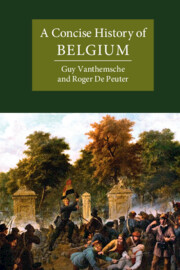Book contents
- A Concise History of Belgium
- Cambridge Concise Histories
- A Concise History of Belgium
- Copyright page
- Dedication
- Contents
- Figures
- Maps
- Acknowledgments
- Note on the Text
- Introduction
- 1 Earliest Times
- 2 The Era of the Frankish Kingdoms
- 3 The Origins of the Medieval Principalities
- 4 Unifying the Netherlands: The Burgundy–Habsburg Period (1384–1555)
- 5 The Spanish Netherlands (1555–1700/1713)
- 6 The Austrian Netherlands (c.1700–1780)
- 7 The Formation of a New Nation-State (1780s–1830)
- 8 The Consolidation of a Bourgeois Regime (1831–1880s)
- 9 The Belgian Nation-State at Its Height (1880s–1945)
- 10 The Metamorphoses of a Nation-State (from 1945 to the Present Day)
- General Conclusion
- Appendix: List of Rulers, Sovereigns and Heads of State (1419–Present) and of Governors General (1507–1794) of the Southern Low Countries and Belgium
- Further Reading
- Index
Introduction
Published online by Cambridge University Press: 16 March 2023
- A Concise History of Belgium
- Cambridge Concise Histories
- A Concise History of Belgium
- Copyright page
- Dedication
- Contents
- Figures
- Maps
- Acknowledgments
- Note on the Text
- Introduction
- 1 Earliest Times
- 2 The Era of the Frankish Kingdoms
- 3 The Origins of the Medieval Principalities
- 4 Unifying the Netherlands: The Burgundy–Habsburg Period (1384–1555)
- 5 The Spanish Netherlands (1555–1700/1713)
- 6 The Austrian Netherlands (c.1700–1780)
- 7 The Formation of a New Nation-State (1780s–1830)
- 8 The Consolidation of a Bourgeois Regime (1831–1880s)
- 9 The Belgian Nation-State at Its Height (1880s–1945)
- 10 The Metamorphoses of a Nation-State (from 1945 to the Present Day)
- General Conclusion
- Appendix: List of Rulers, Sovereigns and Heads of State (1419–Present) and of Governors General (1507–1794) of the Southern Low Countries and Belgium
- Further Reading
- Index
Summary
Until well into the twentieth century, writing “national history” hardly required any justification. On the contrary: for more than a century and a half, it was generally considered a supreme achievement in a successful historian’s career. However, the last few decades have profoundly changed the game, with the breakthrough of new and thrilling approaches to the human past, for instance global, connected, or transnational history. Today, this “old” branch of historiography hardly yields academic glory; it has even fallen into deep disrepute. According to the French historian Nicolas Offenstadt national history is “an ideological instrument, similar to the discourse on national identity. This type of synthesis seems problematic to me, it always sounds false” (cited by the newspaper Le Monde [des Livres], 30 November 2012). This is just one (harsh) expression of the critical stance of many contemporary scholars toward this genre. Obviously, the present Concise History of Belgium needs some clarification – if not an apology.
- Type
- Chapter
- Information
- A Concise History of Belgium , pp. 1 - 15Publisher: Cambridge University PressPrint publication year: 2023

